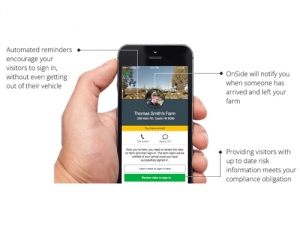On Your Behalf: Health and Safety Checklist for Vineyards and Wineries
Keeping healthy and safe during vintage 2026
 OnSide will launch shortly after the new Health and Safety at Work Act comes into effect next April. Photo: OnSide.
OnSide will launch shortly after the new Health and Safety at Work Act comes into effect next April. Photo: OnSide.
Synlait founder and former Purata chief executive Juliet Maclean have teamed up with two former colleagues to create NZ's first technology-based health and safety system for farmers.
OnSide will launch shortly after the new Health and Safety at Work Act comes into effect next April.
Chief executive and co-founder of OnSide, Ryan Higgs, has worked as Purata's innovation manager. Higgs is a Fullbright scholar with a PHD in Animal Science.
The company's third co-founder, Michael Falconer, has worked as an investment banker and advisor to Synlait during its restructuring and capital raising. Falconer worked alongside senior management experience with Carter Holt Harvey and leadership of health and safety in the challenging forestry sector.
Ryan Higgs says OnSide will fill a gap in the market for farmers looking for a practical tool to help them manage their health and safety requirements.
"There is no other online system like this for the rural community to manage their health and safety needs. Other apps and systems have been tweaked from different industries. The difference with OnSide is that it has been built by farmers for farmers," says Higgs.
"Our objective is to capture the key elements of a safety plan to help farmers from April 2016 when scrutiny around health and safety compliance is going to ramp up."
The OnSide system is well progressed with tech partners Jade Software and testing with farmer focus groups will begin in February, with a view to having OnSide ready for launch in the second quarter of 2016.
The trio have consulted hundreds of farmers and rural industry stakeholders over the past four months to make sure they are on the right track.
One of the things that also became obvious during research this year was that a focus solely on compliance wouldn't deliver the best results, says Higgs.
"Farmers have told us they want to show leadership in health and safety and do the right thing, but the tools to do this have not actually been available. So it's become a compliance and administrative burden for them. This doesn't actually achieve what we all want which is to keep people safe on farms.
"OnSide will focus on showing the value of health and safety in terms of productivity through reduced paperwork and down-time and from minimising incidents," says Higgs.
Farmers will subscribe to OnSide which will make it easy for them to develop their own health and safety plan by working through a pre-populated list of risks overlaid on a satellite map of the farm property.
Contractors and visitors will be prompted to sign in on a smart phone when they cross a virtual 'geo-fence' onto the farm. They will have access to the risks and will be requested to review and acknowledge these risks before signing in. Risks can be updated by the farmer in real time and visitors will need to sign out when they leave. All information will be stored in the cloud avoiding the need for paperwork.
Budou are being picked now in Bridge Pā, the most intense and exciting time of the year for the Greencollar team – and the harvest of the finest eating grapes is weeks earlier than expected.
The Real Estate Institute of New Zealand (REINZ) has released its latest rural property report, providing a detailed view of New Zealand’s rural real estate market for the 12 months ending December 2025.
Rural retailer Farmlands has released it's latest round of half-year results, labeling it as evidence that its five-year strategy is delivering on financial performance and better value for members.
OPINION: "We are back to where we were a year ago," according to a leading banking analyst in the UK, referring to US president Donald Trump's latest imposition of a global 10% tariff on all exports into the US.
DairyNZ says the Government’s proposed Resource Management Act reform needs further work to ensure it delivers on its intent.
Overseas Trade Minister Todd McClay says he's working constructively with the Labour Party in the hope they will endorse the free trade agreement (FTA) with India when the agreement comes before Parliament for ratification.

OPINION: A mate of yours truly reckons rural Manawatu families are the latest to suffer under what he calls the…
OPINION: If old Winston Peters thinks building trade relations with new nations, such as India, isn't a necessary investment in…